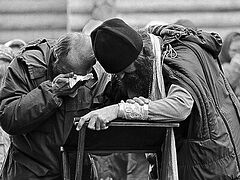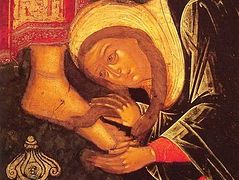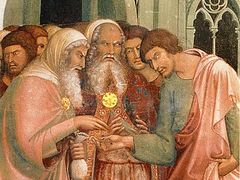 The Mystical Supper. Artist: James Tissot
The Mystical Supper. Artist: James Tissot
I greet you, God-loving communicants of the Mysteries of Christ, with joy for the ineffable gift of God’s mercy which you have now been vouchsafed. I greet you, communicants of that Mystical Supper where our Lord Jesus Christ Himself gave His divine Disciples and Apostles His Most Pure Body and Divine Blood.
And today, He, the Lord, has given you the same Body and the same Most Pure Blood; just as then at the Mystical Supper He celebrated and gave the Holy Apostles His Body and Blood in the form of bread and wine, so now He Himself has celebrated the Sacrament on the holy altar. As He then said to His Disciples: Take, eat; this is My Body… This is My Blood (Mt. 26:26, 28), so now He Himself, through the mouth of His celebrant, says the same.
Do you remember what happened then after the Mystical Supper—where did His Disciples go? Judas went to betray Him to the Jews; Peter—to cowardly deny Him; and the other Disciples fled, leaving Him alone (Mk. 14:50). And this happened even after He warned them, saying: Watch and pray, that ye enter not into temptation (Mt. 26:41, Mk. 14:38).
Wouldn’t He have said the same today to you communicants: Watch and pray? For now, you and all true believers of Christ are facing a great trial. It’s a test of your faith, of your loyalty to Christ. And indeed, isn’t it a test for all Orthodox children of the Church in our times when events so dangerous for faith and piety and so terrible for the Orthodox-Russian people are taking place inside our homeland?!1 Isn’t this a test of faith— this internecine strife, this vacillation of minds in all strata of society, combined with a falling away from faith, with a betrayal of Christ, sometimes with blasphemy and desecration of what was hitherto sacred to everyone?
Is all of this really dangerous only for the integrity of our homeland, and not also for the integrity of the Church, for the purity of Orthodoxy, with the temptation of many falling away from it?
Before the Holy Chalice, or in other words, before Christ Himself, you communicants confessed faith in Him and made a promise not to betray Him like Judas, not to renounce Him like Peter out of human fear.
Let us take care that this temptation not overtake us. In the time of Christ, His Disciples were pejoratively called “Galileans.” The name “Galilean” became a nickname for those who believed in Christ, who followed His teaching, who by living according to His commandments became a reproof for hypocrites, profligates, thieves, and liars. And we see something similar now: The true followers of Christ are given a particular nickname now too. Whoever keeps faith in Christ, purity of conscience, whoever is faithful to his duty, who stands for the God-established government, for his homeland is now called a “Black Hundredist.” This name now has the same shameful meaning as the name “Galilean” used to have.
If you go to Church, if you listen to your pastors, then you’re called a Black Hundredist. If you’re loyal to the Tsar, our beloved motherland, then you’re the same as the Galileans used to be. If you don’t share in godless thoughts, in criminal intentions about the destruction of the exiting order, then they point at you with contempt, saying: “This is a Galilean, a Black Hundredist!”2
And unfortunately, many Orthodox are disconcerted about such a title and are ready to renounce everything that has always been sacred for truly Russian people. They’re ready to swear that we’re Orthodox, but only by birth, in name only, and not by conviction: For us, all faiths are the same; we don’t value the royal power and we’re ready to change it; we don’t stand for the Russian nation, but are ready to consider ourselves citizens of the whole world. In a word, we’re ready to do the same thing that Peter did on the day of temptation, when out of fear of the damsel who recognized him as a Galilean, when forgetting himself out of fear, he said: I know not what thou sayest (Mt. 26:70).
Thus, let us be attentive to ourselves and to what’s happening around us. Let us be firm in our loyalty to Christ, in our love for Orthodoxy, in devotion to the royal autocratic power, and in love for the Russian people, for in this is true piety, in this is loyalty to Christ for our time.
A traitor to God is a traitor to the Tsar. He who is loyal to the Tsar is loyal to God. A traitor to the motherland is a traitor to the faith of the motherland. He who is loyal to the faith of the Fathers will also be loyal to his native land with its laws and ways.
Lord! Grant us to be faithful always and in all things that are pleasing to You.
Lord! We won’t give you a kiss as did Judas; we won’t renounce You for the sake of human fear—only, be with us, All-Good One; may Your grace save us who are faithful to You unto death!



